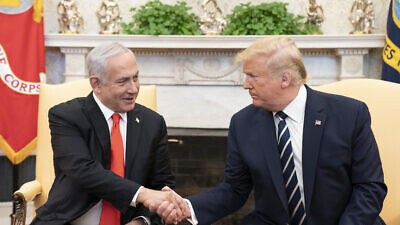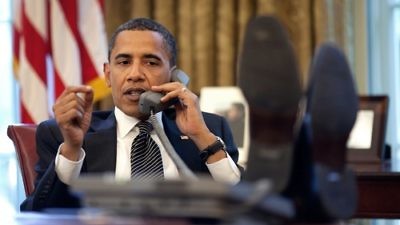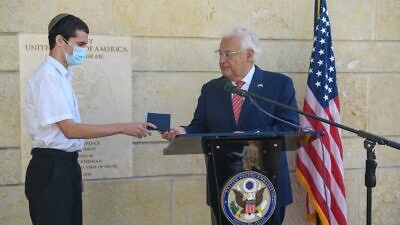
Worry and a sense of missed opportunity hang over Israel’s settlement leadership as we enter the interim period between two U.S. administrations.
Nearly half a million Jews currently live in over 140 recognized settlements and another 70 or so “unregulated” ones, and many settlement leaders are convinced that number could be much bigger if the government of Prime Minister Benjamin Netanyahu had taken the lifeline the Trump administration threw it.
“Another 200,000 thousand people, 25 percent more,” says chairman of the Council of Jewish Communities in Judea and Samaria (Yesha) and head of the Jordan Valley Regional Council David Alhayani, assessing the “missed settlement potential.”
Alhayani and his friends are heart-stricken to see thousands of young couples who wanted to make their homes in the settlements leaving them for communities inside the Green Line because of the housing shortage.
Maaleh Adumim on the eastern fringes of Jerusalem, which until recently was a “frozen” city in terms of settlement, is a classic example.
Its long-serving mayor, Benny Kasriel, says that “since Netanyahu’s speech at Bar-Ilan [University] in June 2009, the Netanyahu government has built about 80 housing units a year in our city. Yes—10 years straight, when the average of the governments prior to Netanyahu was 1,000 housing units per year, sometimes more.”
Kasriel says that in this 10-year period, the city has lost “many young families who wanted to live close to their parents. It’s not Trump or [U.S. President-elect] Biden, it’s us.”
The change of presidents is creating a lot of bustle among settlers, and what was only whispered during the Netanyahu government is now being spoken aloud; Alhayani and Kasriel are not alone. Still, last-ditch efforts are underway to get as much done as possible while Trump is still in office, and everyone’s eyes are on the prime minister. This includes regulating dozens more settlements that have existed under the threat of evacuation and destruction for years.
“It’s not easy,” says Alhayani. “The Prime Minister’s Office is already taking into account the positions of the new [U.S.] administration and trying to not annoy them at the start or appear like they’re trying to make a last grab under the outgoing president.”
One thing is already clear: The issue of the settlements and settlement construction will soon come up as the U.S. administration transitions. Jerusalem remembers very well the last few weeks of the Obama administration in 2016, before Trump entered the White House. Biden, then Obama’s vice president, was very active in promoting U.N. Security Council Resolution 2334, to declare the settlements in “occupied Palestinian territory” illegal. Biden and Susan Rice, Obama’s national security adviser and now a candidate for secretary of state, convinced the representatives of Senegal and New Zealand to take part in submitting the resolution, and pressured Ukraine to vote for it.
In a move considered a slap in the face to Israel, the UNSC passed a decision not to recognize any changes to the ceasefire border of June 4, 1967, including Jerusalem. Of the 15 members of the council, 14 supported the resolution. The United States abstained from the vote, also refraining from exercising its veto.
That history, which involves Biden, is relevant now, not only because of the involvement of the then-vice president in such an anti-Israel resolution, but also because Vice President-elect Kamala Harris opposed the resolution at the time. Harris was even one of the authors of a Senate resolution that expressed opposition to 2334—not because she supported the settlements, but because she thought that the resolution was biased.
That historic resolution, which the Obama administration promoted only a month after Hillary Clinton lost the election to Trump and only three weeks before Trump took office, is now being used by the settlement lobby in Israel and the United States against Trump and Netanyahu. Activists are arguing that what Obama was allowed to do, Trump is also allowed to do. They are referring to a series of urgent steps that “must be completed before Biden takes office.” First on the list is the matter of the unregulated settlements.
Interim decisions
A few days before the election, the Land of Israel lobby in the Knesset, led by Knesset member Haim Katz (Likud) and MK Bezalel Smotrich (Yamina), held a conference that included a tour of settlement outposts. Chairman of the Republicans Overseas Israel, attorney Mark Zell, took part. Zell expressed hope that Trump would not only not oppose regulation, but would work for it.
Knesset Speaker Yariv Levin also attended, which was significant. Levin might be the MK closest to Netanyahu, “closest to the switch,” as Katz put it. Levin promised to join the effort and said that “by the end of the year, we need to finish regulation of as many matters as we can; clean off our desk, expedite regulation of unrecognized places, regardless of who the next president will be.”
That meeting and other similar ones led to a plan of action that combines idealism and pragmatism: legal regulation of unrecognized settlements along with the removal of humanitarian obstacles that currently keep those unrecognized communities from being hooked up to the electricity grid, water supply, roads, mail delivery and more
There are some 20,000 people living in about 50 of these communities, many of which have existed for over 18 years. The way to regulate them is to declare them neighborhoods of existing settlements. That is how it was done with Kerem Reim next to Talmon, or Ibei Hanachal next to Maale Amos.
The lobby’s list includes dozens more outposts. But in many of them, the process of surveying the land on which they sit as state-owned land is incomplete. The drawn-out process, even though it will likely be completed successfully, convinced the settlers to seek an interim decision, a Cabinet decision that will allow these outposts to receive budgets and basic services.
Such basic services include public transportation, water, electricity, mikvehs, nursery schools and daycare centers, sports centers and a long line of standard services enjoyed by all the regulated settlements but not unregulated ones like Har Hemed or the Nahalat Ami neighborhood of Otniel. Even the veteran outpost of Givat HaYovel, next to Eli, which was home to IDF Maj. Eliraz Peretz, who was killed in battle in the Gaza Strip in 2010, and IDF Maj. Roi Klein, who was killed in Bint Jbeil in the Second Lebanon War, falls into the unregulated category. In recent months, the settlers have held a few meetings with Defense Ministry civil and social affairs chief Michael Biton of Blue and White. Biton is showing good will, understands their distress, and is trying to help them on humanitarian grounds.
The Mevo’ot Yeriho precedent
There are also 24 unregulated settlements that appear to have no chance of ever being declared neighborhoods of existing settlements. They are too far away, or legal issues prevent them from being recognized as such. The most obvious communities in this category are Asael and Avigayil in the south Hebron Hills, which are home to over 100 families, including 300 children. They were both founded more than 15 years ago.
Outposts sharing their status are Aloney Shilo, founded 20 years ago not far from Karnei Shomron and named after Staff-Sgt. Shilo Levy, who was killed in the 1997 helicopter disaster; Givat Haroeh, founded in 2002 and home to 40 families and over 100 children; and Nofei Nehemia, home to 50 families and 150 children, which sits to the east of Ariel. The settlers are hoping the government will decide in their favor before President-elect Joe Biden enters the White House. The lone precedent is Mevo’ot Yeriho, which the government in 2019 declared a new, independent settlement just before the 22nd Knesset was sworn in.
The chances of a repeat of the Mevo’ot Yeriho story are unclear. It would require agreement from Blue and White, but even before that could happen, Netanyahu is loath to start off his relations with President-elect Biden on the wrong foot. Only last November Biden called the settlements “an obstacle to peace,” and in May of this year he declared that they strangled “any hope of peace.”

On the other hand, Trump has another two and a half months in the White House, and Netanyahu might ask to take advantage of the sort time left to get as much as he can from him, not only in Judea and Samaria, but also in Jerusalem—for example, progress on plan to build in Atarot in the north of the city. The fact that Israel, too, will soon be facing an election could influence the prime minister, who very much needs the support of the settlers and their activists in the Likud.
Alhayani suggests that his cohort ignore the change of U.S. administration and “do what is best for Israel.” Alhayani has still not abandoned hope that Israel will declare sovereignty over its settlements in Judea and Samaria and the Jordan Valley. Nor is he willing to panic over the future Biden administration. He says that under Trump, “relatively few housing units were built in Judea and Samaria every year, compared to the number of units constructed under the Obama administration.”
Alhayani thinks that this might have happened because “the Israeli government didn’t want to clash with such a friendly administration, whereas under Obama, we dared to do more.”
He also thinks that the Americans “won’t force anything on us, certainly not evacuation of settlements. The reality on the ground is too big for that to be practical, and the declaration in the Trump peace plan—even if Biden doesn’t adopt it—that no Jewish settlement will be evacuated also carries weight.”
Alhayani makes it clear that his problem isn’t with “any one president or another, but with my prime minister. I am really concerned over the possibility that Netanyahu will continue to fudge the matter of settlement regulation, like he has done so far. I also don’t really believe he is determined enough to carry out the hugely strategic E-1 construction plan—the plan to connect Maaleh Adumim to Jerusalem, which was approved only a few months ago, after years of delays.”
A different starting point
Kasriel, who recently received a green light for 700 new housing units in his city, admits that he does not understand Netanyahu’s approach to the settlements.
“Sometimes I feel like he’s toying with us. It’s not plausible that I’ve been waiting over a year for the prime minister’s approval to add a floor to 16 existing homes here in Maaleh Adumim—that’s the greater Jerusalem area. That’s consensus, not some far-flung settlement, although they have rights, too.
“Something doesn’t make sense in the way that I need approval from the Prime Minister’s Office for a plan to build for industry, or schools, or to add rooms, or build balconies,” said Kasriel.
“These are things that have nothing to do with the Americans or the Palestinians. I expected more from Netanyahu. Even the 700 new apartments we’re building now, after a decade of a construction freeze, we’re building in close conditions inside the city,” he added.
MKs close to Netanyahu want to calm everyone down. Netanyahu, they say, has done more than any other prime minister to promote settlement in Judea and Samaria, but while taking into consideration the international pressure on Israel and the country’s vital interests.

These close associates of the prime minister say that even under Biden, Netanyahu will continue to work for the settlements. They mention the difficult beginning of the Obama administration, when Netanyahu’s first meeting with the new president (in May 2009) raised disputes almost immediately about the Iran issue, construction in Jerusalem, and the settlements. John Podesta, head of Obama’s transition team, and Mara Rudman, who later became deputy to Obama’s special Middle East envoy George Mitchell, even suggested that the president take steps to take away Israel’s sovereignty in the Old City of Jerusalem and establish a special international government in the holy parts of the city.

Today, sources close to Netanyahu say, the start of ties between him and Biden will be much better: the U.S. Embassy has been relocated to Jerusalem and Biden has already declared he will not move it. Even if the new administration does not adopt the Trump peace plan, it will still have an effect, especially the outgoing president’s statement that no Jewish settlement will be evacuated.
Biden, the MKs close to Netanyahu believe, is not Obama. His record proves that, even though his positions on the settlements are closer to Obama’s than to those of Trump.
{JNS}
{Matzav.com}












“he does not understand Netanyahu’s approach to the settlements”
Netanyahu has never been a Greater Israel guy. He is no Begin. He is no Shamir. He is no Sharon. Even Peres was more into settlement building. For Netanyahu it has always been about security, not settlements.
“the U.S. Embassy has been relocated to Jerusalem and Biden has already declared he will not move it.”
Biden wanted it to be moved in the 1980s! He failed to convince five Presidents. He will be president now and will not change on this.
“
Stock up on kleenex immediately.
The settlements are dangerous.
Let’s face it.
Many people died there.